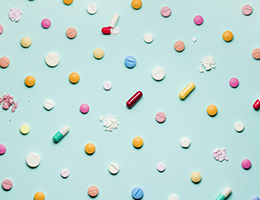
You can probably rattle off the names of high-profile athletes who've used anabolic steroids as a quick fix for bulking up and boosting performance.
So it's no surprise, really, that steroid use has filtered down to impressionable teens. And some of these kids aren't just looking for an edge in sports. They are turning to steroids to change their appearance by adding muscle.
Why steroids are dangerous
Anabolic steroids are powerful prescription drugs that mimic the effects of testosterone. As a result, they spur cell growth, particularly muscle cells. They also increase male physical traits.
These drugs have legitimate medical uses. For instance, they can treat anemia or hormone problems in men, such as delayed puberty. They are also used during treatment for serious illnesses like AIDS and breast cancer. Anabolic steroids shouldn't be confused with corticosteroids, which are a common treatment for health problems like asthma and eczema.
Still, like all drugs, anabolic steroids can cause side effects—and some may be lasting, according to the National Institutes of Health. Steroids may cause:
- Stunted growth.
- Severe acne.
- Baldness.
- High blood pressure, unhealthy cholesterol levels and heart disease.
- Blood clots and stroke.
- Liver damage and jaundice.
- Aching joints and muscle cramps.
- Raised risk of muscle injuries.
- Mood swings and aggressive behavior.
- Mania or depression.
For boys, steroids can also cause a low sperm count, impotence, shrunken testicles and breast growth. For girls, possible side effects include a deep masculine voice, more facial and body hair, shrinking breast size, and problems with periods.
What about other performance enhancers?
Some teens may turn to other prescription and over-the-counter substances to boost athletic performance. But these can also be risky. For instance, human growth hormone has side effects like painful, swollen joints and sore muscles. And when sold illegally, it may contain unknown and harmful ingredients, the Endocrine Society warns.
Dietary supplements, like those used for body-building, aren't regulated by the U.S. Food and Drug Administration. So they may also be contaminated with steroids or other harmful substances.
What parents can do
Since teen steroid use is so risky, it's crucial to be aware of the signs that your child may be using these drugs. Watch for a surprising gain of muscle mass, dramatic changes in mood or behavior, and the physical side effects you've just read about.
Make steroids part of the conversation whenever you talk with your teens about drug use. Take the opportunity to correct any misinformation your teen might believe—for example, that steroids don't have serious side effects. Help enable your child to say no if someone offers them steroids or other drugs.
Reviewed 2/21/2025